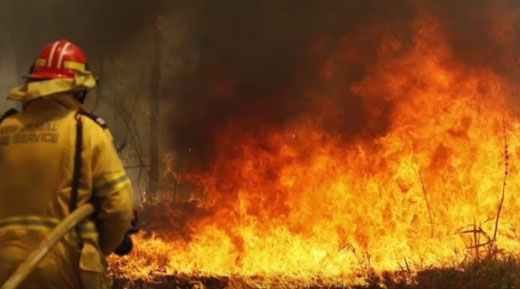by WorldTribune Staff, January 21, 2020
The catastrophic bushfires in Australia have claimed at least 28 lives, destroyed more than 2,600 homes and scorched more than 25.7 million acres.
Leftists blame human-caused climate change for the fires, with conservative Australian Prime Minister Scott Morrison being a favorite target of progressive anger.

“The PM has faced mounting criticism over his government’s response to the bushfires and its climate policy,” the BBC contended earlier this month.
“Australia’s bush fires reveal Scott Morrison has lost his way”, blared a Washington Post headline.
But there is mounting evidence that the fires have more to do with environmentalist policies than fossil fuel emissions, Washington Times reporter Valerie Richardson noted in a Jan. 20 report, citing climate scholars.
“The devastation follows years of eco-driven government policies discouraging prescribed burns, tree-thinning and firebreak-building in the name of forest and habitat preservation,” the scholars say, Richardson wrote.
A prolonged drought after years of high foliage growth driven by above-average rainfall, and the progressives’ policies created a recipe for disaster, said Myron Ebell, director of the Center for Energy and Environment at the free market Competitive Enterprise Institute.
“Once the drought hit, all this new vegetation means there are new and bigger fires. And the reason there are more and bigger fires is that they have basically stopped prescribed burns,” said Ebell.
Ebell called Australia’s policy “a stunning example of criminal human mismanagement.”
The fires in Australia have been compared to the California wildfires which were “sparked by power lines in forests choked with dead and tinder-dry trees after years of drought and hands-off timber policies,” Richardson wrote.
CEI senior fellow Patrick Michaels, who served as Virginia state climatologist for 27 years, said that “Both California and Australia have made it very hard to do the prescribed burning that is necessary to prevent catastrophic fires.”
“They will be subject to horrific fires every year until the understory is cleaned up, with or without global warming,” Michaels said. “The brush dries out enough every year to burn because of the average climate, not climate change.”
Climate activists and celebrities are pushing a much different narrative.
At the Golden Globe awards earlier this month, climate change and the bushfires “were the causes du jour,” Richardson wrote.
Jennifer Aniston read a statement by Russell Crowe, the Australian actor who said he stayed behind to protect his home. “Make no mistake: The tragedy unfolding in Australia is climate-change based,” Aniston said, quoting Crowe. “We need to act based on science, move our global workforce to renewable energy, and respect our planet for the unique and amazing place it is. That way, we all have a future.”
Alarming headlines include “Australia Is Committing Climate Suicide,” atop a Jan. 3 op-ed in The New York Times by novelist Richard Flanagan, and in The [UK] Guardian, “Australia fires are harbinger of planet’s future, say scientists.”
Kelly O’Shanassy, CEO of the Australian Conservation Foundation, said big “polluting corporations are responsible for this crisis but are evading responsibility.”
“Record-breaking drought and heat are making bushfire conditions evermore catastrophic. This is climate damage,” O’Shanassy said in a statement. “And the biggest cause of climate damage is burning coal.”
H. Sterling Burnett, senior fellow for environmental policy at the free market Heartland Institute, said the bushfires could be chalked up to three factors: bad weather, bad policy and bad people.
The last year has been described as Australia’s hottest and driest on record, but it wasn’t enough of an outlier “to make a difference between fire and no fire,” said Burnett, adding that about 40 low temperature records have also been set Down Under.
The “bad people” refers to those charged with arson. The New South Wales police reported Jan. 6 that 183 people had been charged with fire-related offenses, including 24 for deliberately setting fires, 53 for failing to comply with the fire ban and 47 for discarding cigarettes or matches.
As for policy, Australia “started following the same policies as the western United States and setting aside land, locking it up, not allowing thinning in part for species habitat,” Burnett said.
“You can thin the forests and maybe have fewer koalas, but that’s far better than having overgrown forests, that when they burn during a drought wipe out the whole forest and the entire population of koalas that depend on it,” Burnett said.
Roy Spencer, of the University of Alabama in Huntsville, noted that global wildfire activity is on the decline. NASA recently reported a 25 percent drop in the area burned by wildfires since 2003. Spencer attributed outbreaks to the increased chance of human ignition, given that the Australian population has grown fivefold in the past 100 years.
“A related reason is the increasing pressure by the public to reduce prescribed burns, clearing of dead vegetation, and cutting of fire breaks, which the public believes to have short-term benefits to beauty and wildlife preservation, but results in long-term consequences that are just the opposite and much worse,” Spencer said on his global warming blog.
Spencer said blaming the bushfires on human-caused climate change is “mostly alarmist nonsense, with virtually no basis in fact.”
Ebell concurred: “Taking advantage of the bushfires in Australia is really strong evidence that the global warming crowd has no scruples at all. It’s clear this isn’t global warming. This is gross mismanagement of resources.”
Morrison, meanwhile, told Australia’s ABC Radio that he would continue to meet the nation’s emissions reduction pledges but would oppose anything that would “wipe out” the economic base that depends on natural resources.
“I’ll tell you what I’m not going to do,” he said. “I’m not going to put a carbon tax on people, I’m not going to increase their electricity prices and their costs of living, and I’m not going to wipe out resource industries.”
Intelligence Brief __________ Replace The Media
